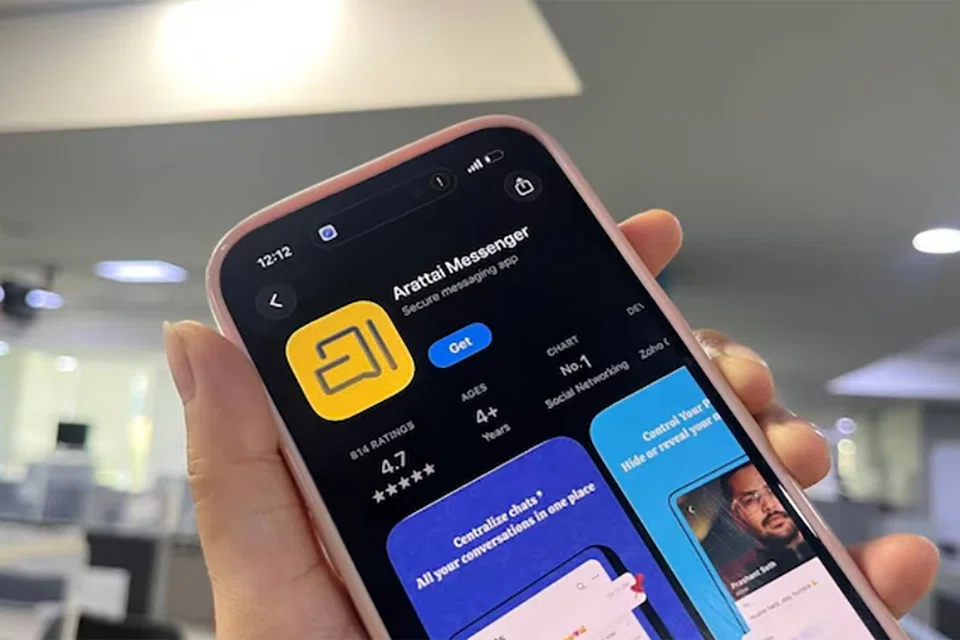For years, WhatsApp has been an inseparable part of Indian digital life – used for everything from morning greetings to business transactions. But now, a new challenger has arrived: Arattai, a Tamil word meaning “banter”.
Developed by Chennai-based tech giant Zoho Corporation, the homegrown messaging app has suddenly gone viral, amassing over 7.5 million downloads in just a week – a dramatic leap from fewer than 10,000 in August, according to Sensor Tower.
Arattai’s sudden rise is closely tied to India’s growing call for “Swadeshi” or self-reliant technology.
With trade tensions flaring after Washington imposed steep tariffs on Indian goods, Prime Minister Narendra Modi and several ministers have urged citizens to use locally developed software.
“Make in India, spend in India,” has become the slogan. Union ministers Piyush Goyal, Dharmendra Pradhan, and Ashwini Vaishnaw have all endorsed Arattai on social media, calling it an Indian alternative to WhatsApp, reported Reuters.
“So proud to be on Arattai, a #MadeInIndia messaging platform that brings India closer,” Mr Goyal posted on X.
Zoho’s CEO Mani Vembu says the endorsement gave the app a massive boost: “In just three days, daily sign-ups jumped from 3,000 to 350,000. Active users grew 100-fold, and the number keeps rising. It shows users are enthusiastic about a homegrown product that meets their unique needs.”
Behind Arattai’s seemingly simple interface lies two decades of engineering research.
Zoho’s billionaire founder and chief scientist, Sridhar Vembu, said in an X post that the app is powered by the company’s proprietary messaging and audio-video framework, perfected over 15 years to deliver crisp calls and reliable performance even on slow networks.
“Arattai may look simple on the surface, but it has a lot of depth inside,” he wrote. “Our distributed architecture manages massive workloads, ensures fault tolerance, and strengthens security. That’s the unseen foundation of all Zoho products.”
Mr Vembu praised his team for “working patiently for five years without expecting instant success,” urging them to “allow neither praise nor criticism to distract you.”
Arattai offers all the staples of modern messaging – text, voice and video calls, group chats, and business tools — optimised for low-end phones and patchy connections, reported NDTV. But it also includes unique features that could appeal to Indian users:
Pocket: A built-in cloud folder to store personal notes, messages, or media – eliminating the need to create self-chat groups as on WhatsApp.
Meetings: Users can start or schedule video meetings directly from the app without switching to Zoom or Google Meet.
Mentions: A dedicated tab highlights messages where users are tagged, similar to Slack, making group chats easier to manage.
No ads or forced AI: Unlike WhatsApp’s Meta AI integration, Arattai remains ad-free and avoids intrusive features.
Data stored in India: All servers and user data are housed within Indian data centres.
Despite the excitement, questions about data privacy linger. While Arattai encrypts voice and video calls, end-to-end encryption (E2EE) for text messages is still being rolled out.
“We had planned to launch after implementing full E2EE,” Mr Vembu explained. “But the sudden surge advanced our timelines. Once encryption is in place, even we won’t have access to user conversations.”
Critics note, however, that India’s data laws could put domestic apps in a bind. “The government can easily demand traceability of messages citing security concerns, which weakens privacy,” said Mr Shashidhar KJ, managing editor at MediaNama.
Legal experts add that international platforms like WhatsApp or X have the financial muscle to challenge government data requests – a luxury Indian startups might not have.
Technology lawyer Rahul Matthan says Zoho will need to clearly define its privacy architecture and how it handles user-data requests to gain widespread trust. “Without that clarity, many users may hesitate to switch,” he said.
India is WhatsApp’s largest market, with more than 500 million active users – almost every smartphone owner. Breaking that dominance will be a steep climb.
“Only state patronage won’t be enough,” says Mr Dilip Cherian, co-founder of PR firm Perfect Relations. “Zoho needs a strong differentiator, deep pockets, and clear protection from surveillance.”
Analyst Prasanto K. Roy agrees. “National pride can drive downloads, but retention depends on experience. It’s unlikely any app can replace WhatsApp’s global ecosystem of users and businesses.”
Still, experts believe Arattai’s rise reflects a broader trend of digital self-reliance.
Mr Tarun Pathak of Counterpoint Research says India’s digital mission increasingly demands indigenous platforms in cybersecurity, AI, and cloud infrastructure. “Security is going to be critical,” he said. “The best way forward is to build on a local stack – that’s what the government aims to do.”
The story of Arattai is as much about national sentiment as it is about software. It has become a symbol of India’s push to build its own digital ecosystem – from MapmyIndia maps replacing Google, to Zoho rivaling Microsoft, and now Arattai taking on WhatsApp.
Indian industrialist Anand Mahindra summed up the mood when he posted: “Downloaded Arattai with pride. Wishing it great success.”
Whether Arattai can sustain its momentum or fade like earlier challengers such as Koo and ShareChat remains to be seen. But with millions already signing up – and a government keen to champion “Made in India” tech – Zoho’s modest messaging app has, at least for now, struck a powerful chord of digital patriotism.

